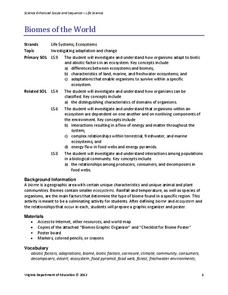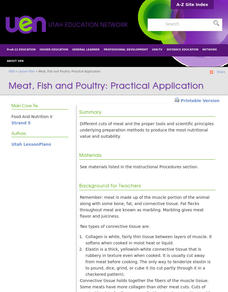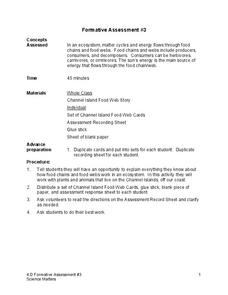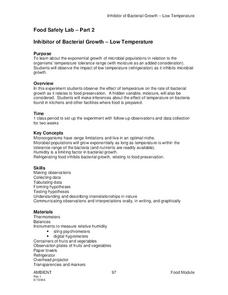Curated OER
Food Safety
Students recognize that safe food preparation is important to good health. In this food safety lesson plan, students participate in an activity students separate, clean, chill, and cook food safely. Students use Glo Germ to find where...
Consortium for Ocean Science Exploration and Engagement (COSEE)
Arctic Smorgasbord
Though the walrus spends roughly one third of its time on land, it eats organisms that live on the bottom of the ocean. The first in a series of five, the lesson uses a variety of plant and animal cards to have scholars build an arctic...
Worchester Polytechnic Institute
Interactive Laboratory Activities for Secondary Education
Do you think the lab smells like rotten eggs? Sorry to hear about your sulfering. A set of five experiments covers many different topics including seasons, gravity, food, precipitation, and photosynthesis. Though not presented as a...
Curated OER
Gathering, Traditions, and Nutrition of Our Food
Young scholars gain a better understanding of what it means to eat seasonally through learning about traditional hunting, gathering, and food preparation methods of Athabascan tribes. By interacting with Native American Elders and...
Curated OER
Food Science, Scientific Method: Reliability and Validity in Empirical Research
Secondary learners explore food science by conducting an experiment using the scientific method and creating a science fair project based on their findings. They learn about food technology and modern research development. They...
Baylor College
Serving Sizes
Are serving sizes for different foods always appropriate for what you need? In this hands-on activity, learners work in groups to estimate what one serving size of various foods are, and then evaluate their hypotheses by measuring real...
Columbus City Schools
ABC: Acid Base Chemistry
Bubble, bubble, boil and trouble! What causes common substances like baking soda and vinegar to react the way they do? Welcome your junior chemists to the wonders of acid-base chemistry using a comprehensive and fun resource. Engage them...
Curated OER
Science Lessons for Grade 7
Seventh graders construct a food chain based on pictures shown on the board. In this biology lesson, 7th graders describe the motion of particles as energy is changed. They explain how pH changes during neutralization.
Virginia Department of Education
Biomes of the World
Incorporate knowledge about biomes and ecosystems in multiple ways while encouraging creativity. Emerging ecologists collaborate and perform research to complete a graphic organizer about various biomes of the world. They conclude the...
Curated OER
Tropical Forest Food Chain
Learners explore the interdependence of the animals and plants in tropical rainforests. They explore the importance of conserving biodiversity and tropical food chains. They create a tropical forest food chain and identify species that...
Curated OER
Create a Food Chain
Students discover the connection between plants and animals by discussing simple food chains. Students explore what may happen when parts of a food chain are removed. Students wrap up the lesson plan by writing a story about a food chain.
Learning Games Lab
The pH Scale and Meter Calibration
What are the different ways to test for pH? First, scholars explore the pH scale and a common way to test for acidity and alkalinity. Then, they learn about the importance of pH in food safety and why variance in pH could potentially...
Curated OER
Genetically Modified Food (GMF)
Explore genetically modified foods through various experiments. In this biology lesson, students discuss the safety issues related to GMF's. They conduct a PCR analysis to identify the presence of genetic modification.
Virginia Department of Education
Macromolecules
Finally, a chance for the class to play with their food! Allow pupils to simulate stomach acid with common foods, and introduce specific macromolecules into the mixture to explore characteristics of carbohydrates, lipids, and proteins....
Curated OER
Reading Comprehension Worksheet: Food
After reading two paragraphs about food, learners must answer 4 questions about what they have read. This is a great worksheet to practice reading comprehension, and would be very helpful practice prior to state testing. The writing...
Curated OER
Meat, Fish and Poultry: Practical Application
A note-taking outline is given to learners which covers meat composition and quality, types of meat and storage, and cooking meat. By viewing pictures they learn to identify cuts of meat or poultry products. They discuss inspection and...
Towson University
The Crucial Concentration
Which sports drink provides the best pick-me-up after the big game or grueling workout? It may not be the one you'd think! Food science is the focus in a surprising lab activity. Pupils use colorimetry to determine the amount of protein,...
Polar Trec
Arctic Smorgasbord!
Two blooms of phytoplankton, instead of just one, now occur in the Arctic due to declining sea ice, which will have widespread effects on the marine life and climate. In small groups, participants build an Arctic food web with given...
Science Matters
Formative Assessment #3
Thirteen short-answer questions follow a brief food web activity in a formative assessment designed to test knowledge of ecosystems and the energy that flows through them.
Science Matters
Peanut Energy
How do humans get energy since they aren't mechanical and can't photosynthesize? Learners explore this question by relating potential energy in food to human energy levels. Scholars measure the change in mass and a change in temperature...
Curated OER
Science as Inquiry: what is starch and how can we test it?
Sixth graders discuss nutrients and examine foods for starch. In this starch testing lesson plan, 6th graders use iodine to test foods for starch and record their results. Students complete a worksheet and self reflection.
Curated OER
Chapter 16, Food Biotechnology
Although the points given on these slides are valid, the visual accessibility is poor. Consequently, many viewers would be distracted or entirely unable to view the presentation. The content is a review of microorganisms and their...
Curated OER
Food Safety Lab
Students use the scientific method to investigate the role of temperature in microbial growth. In this food preservation lesson, students set up an experiment with fruit in room temperature and in a refrigerator. They record the...
Curated OER
The Circulatory System--Part III
Students research the process for the preparation of a soup. Students explore the safety issues of food preparation. Students, after presenting their soups to the class, will eat their soups that they have prepared.

























